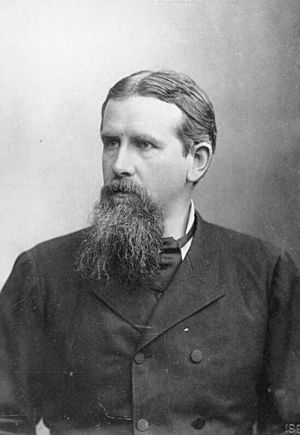Friedrich Ratzel facts for kids
Quick facts for kids
Friedrich Ratzel
|
|
|---|---|

Friedrich Ratzel
|
|
| Born | August 30, 1844 |
| Died | August 9, 1904 (aged 59) Ammerland, Lake Starnberg, Bavaria
|
| Nationality | German |
| Education | University of Heidelberg University of Jena Humboldt University of Berlin |
| Known for | Concept of lebensraum |
| Scientific career | |
| Fields | Geography Ethnography |
| Institutions | Leipzig University |
| Influences | Charles Darwin Ernst Haeckel |
| Influenced | Ellen Churchill Semple |
Friedrich Ratzel (born August 30, 1844 – died August 9, 1904) was an important German geographer and ethnographer. He is famous for being the first to use the term Lebensraum, which means "living space." This term was later used by the National Socialists (Nazis).
Contents
Early Life and Education
Friedrich Ratzel grew up in Karlsruhe, Germany. His father worked for the Grand Duke of Baden. Friedrich went to high school for six years. When he was 15, he started training to be an apothecary (a type of pharmacist).
In 1863, he moved to Rapperswil, Switzerland, and began studying classic subjects. After working as an apothecary for another year, he decided to study zoology. He attended universities in Heidelberg, Jena, and Berlin. He finished his studies in 1868. In 1869, he wrote a book about Charles Darwin's ideas.
Becoming a Geographer
After finishing school, Ratzel started traveling a lot. These travels changed him from a zoologist (someone who studies animals) into a geographer (someone who studies the Earth and its features). He began his field work in the Mediterranean region.
He wrote letters about his travel experiences. These letters helped him get a job as a traveling reporter for a newspaper called the Kölnische Zeitung. This job allowed him to travel even more.
Travels to North America
One of Ratzel's most important trips was in 1874-1875. He traveled to North America, Cuba, and Mexico. This trip was a major turning point in his career. He studied how people of German origin lived in the United States, especially in the Midwest. He also studied other ethnic groups in North America.
In 1876, he wrote a book about his travels called Städte-und Kulturbilder aus Nordamerika. This book helped create the field of cultural geography. Ratzel believed that cities were the best places to study people. He said that life in cities is "blended, compressed, and accelerated." He visited many big cities like New York, Boston, Philadelphia, and San Francisco.
Academic Career
When Ratzel returned from his travels in 1875, he became a lecturer in geography. He taught at the Technical High School in Munich. He quickly became an assistant professor in 1876 and a full professor in 1880. While in Munich, Ratzel wrote several important books.
In 1886, he moved to Leipzig University. Many students attended his lectures. Two famous students were Ellen Churchill Semple, an influential American geographer, and Martha Krug-Genthe. Martha was the first woman to earn a doctorate degree in geography.
Key Works and Ideas
Ratzel wrote a two-volume work called Anthropogeographie in 1882 and 1891. This book laid the groundwork for human geography. Human geography studies how humans and their environment interact. Some of his students misunderstood his work. They developed ideas like environmental determinism. This is the idea that the environment completely controls how people live.
In 1897, he published Politische Geographie (Political Geography). In this book, Ratzel introduced ideas that contributed to the concepts of Lebensraum and Social Darwinism. Lebensraum means "living space." Social Darwinism is an idea that applies Charles Darwin's theory of natural selection to human societies. It suggests that some groups are "fitter" and naturally expand.
Ratzel also wrote a three-volume work called The History of Mankind. This book was published in English in 1896. It included many detailed pictures and colorful illustrations.
Later Life and Legacy
Friedrich Ratzel continued his work at Leipzig University. He died suddenly on August 9, 1904, near Lake Starnberg, Germany.
Ratzel was a very smart scholar with many interests. He was also a strong German patriot. When the Franco-Prussian War started in 1870, he joined the Prussian army. He was wounded twice during the war.
Understanding Lebensraum
Ratzel's ideas were influenced by thinkers like Charles Darwin and zoologist Ernst Heinrich Haeckel. He wrote an essay called Lebensraum in 1901. This essay was about biogeography, which studies where living things are found. This work helped create a German type of geopolitics. Geopolitics studies how geography affects politics and international relations.
Ratzel's writings became popular during a time when German industries were growing. Germany was looking for new markets around the world. This put them in competition with countries like Britain. Ratzel's ideas were sometimes used to support imperialism. Imperialism is when a country extends its power over other lands.
Ratzel was also influenced by Alfred Thayer Mahan, an American who studied how sea power affects countries. Ratzel believed that Germany needed a strong navy. He thought that profits from international trade could help pay for a large merchant fleet.
Ratzel's idea of Raum (space) came from his view of states as living organisms. His early idea of Lebensraum was not mainly about politics or money. It was more about the idea that people with a great Kultur (culture) would naturally expand. For Ratzel, "space" was a broad idea. He thought that Raum was where German people lived. He also thought that weaker states could support German people economically. He believed German culture could influence other cultures. However, Ratzel's idea of Raum was not meant to be aggressive. He simply thought it was natural for strong states to expand into areas controlled by weaker ones.
His most famous book, Anthropogeographie, was written between 1872 and 1899. This huge work mainly focused on how different physical features and locations affect people's lives and cultures.
See also
 In Spanish: Friedrich Ratzel para niños
In Spanish: Friedrich Ratzel para niños

